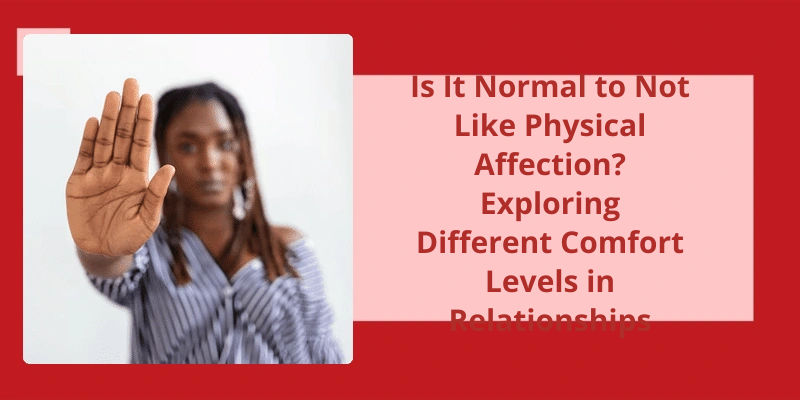Physical affection is often seen as an essential part of human connection, but what happens when someone simply doesn't enjoy it? While many people crave hugs and cuddles, others feel uncomfortable or even repelled by them. This reluctance towards physical touch can have various causes, ranging from different upbringing experiences to mental health conditions like social anxiety. Regardless of the reasons, the fact remains that some individuals simply don't find physical affection enjoyable. And yet, this doesn't make them any less human or incapable of forming meaningful relationships. In fact, understanding and accepting different preferences for touch can help build stronger and more authentic connections in our personal and professional lives.
Why Do I Desperately Want Affection?
However, the reasons behind why one may desperately seek affection can vary greatly. Some may have had a lack of physical touch in their childhood, and therefore crave it more intensely as adults. Others may struggle with feelings of loneliness or disconnection, and seek out physical affection as a means of feeling more connected to humanity. It’s also important to note that some individuals may struggle with mental health challenges, such as anxiety or depression, which can exacerbate their need for physical touch and connection.
One way to deal with this intense yearning for affection is to seek out quality connections with others in non-romantic ways. For example, volunteering, joining a club or group, or simply spending more time with friends and family can help individuals feel more connected to others, and may even provide some of the physical touch they crave. Additionally, practicing self-compassion and self-care can also be helpful in addressing the underlying emotions that may be driving the intense need for physical affection.
The Impact of Cultural and Societal Norms on Our Need for Affection
Our need for affection is strongly influenced by the cultural and societal norms we grow up with. These norms shape our attitudes towards physical touch, emotional intimacy, and expressions of love. For example, some cultures prioritize individualism and personal space, leading to less physical touch and a greater emphasis on independence. Others encourage close physical contact and nurture emotional connections from an early age. Understanding how cultural and societal norms impact our need for affection can help us better appreciate and respect different forms of expressing love and intimacy.
It’s natural to crave affection. However, for some people, receiving affection can be a complex and uncomfortable experience. If you find yourself feeling anxious or on-edge when someone tries to show you affection, you might be one of the many people who can relate. In this article, we’ll explore the reasons why you might feel uncomfortable with affection, and how you can start to work through these feelings.
Why Do I Want Affection but When I Get It I Get Uncomfortable?
Another possibility is that you’ve attachment issues. You might have a fear of getting too close to someone or fear of abandonment. This can cause you to crave affection but when it comes, you feel vulnerable and afraid. You might also have intimacy issues which can make you uncomfortable with physical touch or emotional closeness. It’s important to understand whats causing these feelings so you can work to overcome them.
It’s also possible that you’ve trouble accepting vulnerability. When someone shows you affection, it requires you to open up and be vulnerable with them. You might not feel comfortable with this level of exposure. It’s important to understand that vulnerability is necessary for building strong relationships and that it’s okay to have moments of vulnerability.
Negative past experiences can also play a role. Perhaps youve been hurt or betrayed in the past by someone you loved and trusted. This can create a fear of opening up to others in fear of being hurt again. It’s important to acknowledge these past experiences and work through the pain so that you can move forward and not let them affect your future relationships.
Lastly, cultural and societal norms can also impact how you view affection. For example, some cultures are more reserved when it comes to showing physical affection, while others are more open and expressive. Society may also dictate certain gender norms when it comes to affection. It’s important to recognize these influences and determine what feels comfortable and authentic for you.
Understanding the root causes of these feelings can help you work through them and build stronger, healthier relationships. It’s okay to take your time and go at your own pace when it comes to vulnerability and intimacy. Remember to always prioritize your emotional well-being and do what feels right for you.
How to Communicate Your Feelings About Affection to a Partner or Loved One in a Healthy Way
- Use “I” statements to express your feelings.
- Be specific about what you need from your partner in terms of affection.
- Avoid accusatory language and instead focus on expressing your wants and needs.
- Listen actively to your partner’s response and be open to their perspective.
- Express your appreciation for your partner’s efforts to meet your emotional needs.
Source: I feel uncomfortable when people show me affection. …
However, there are also deeper psychological and emotional factors at play that contribute to the need for intimacy and affection. These can include past traumas, low self-esteem, and unfulfilled emotional needs. Let’s explore some of these factors in more detail and understand why we crave affection so deeply.
Why Am I Craving Affection So Bad?
To some, this may be due to societal factors, like living in a highly individualistic culture where people may not place as much importance on building strong, intimate relationships. Alternatively, it could stem from past traumas or negative experiences with intimacy, which leads to a reluctance to pursue close relationships.
Furthermore, the need for affection could be a result of certain biological or psychological factors. For instance, studies have shown that oxytocin, also known as the “love hormone,” plays a crucial role in feelings of bonding and attachment to others. Thus, if there’s a deficiency in the release of oxytocin, it could lead to a sense of loneliness and emptiness that only intimate connections can fill.
It’s also important to note that the craving for affection could manifest in different ways for different people. Some may seek out physical touch, like hugs or cuddles, while others may crave emotional support and validation through acts of kindness and words of affirmation. Either way, the underlying desire for closeness and connection remains.
You aren’t alone in your search for intimacy, and there are steps you can take to fulfill this need. Whether it’s through building stronger relationships with loved ones or seeking out new connections, prioritizing and actively pursuing intimacy can lead to a happier, more fulfilling life. So, take care of yourself and your needs, and know that affection and love are always within reach.
However, there are various reasons why some individuals may not be fond of physical affection, with social anxiety being a common factor. Additionally, cultural beliefs and experiences can also contribute to a person’s discomfort with touch.
Why Do Some People Not Like Physical Affection?
Some cultures place more emphasis on physical touch and affection than others. In these cultures, it can be seen as rude or standoffish to refuse a hug or a kiss on the cheek. For people who grew up outside of these cultures, physical affection may feel uncomfortable or even invasive. However, even people from affectionate cultures can feel uncomfortable with physical touch if they’ve had negative experiences with it in the past.
Trauma, abuse, or neglect in childhood can cause people to develop a preference for avoiding physical touch. For some survivors of abuse, physical touch can trigger traumatic memories or cause intense anxiety. Even if a person doesn’t have a history of abuse, simply feeling vulnerable or exposed can make physical touch feel uncomfortable. This may be especially true for people who struggle with body image or self-esteem issues.
It’s also important to remember that everyone has different boundaries and preferences when it comes to physical touch. Even people who enjoy hugging and cuddling may not want to be touched in certain ways or by certain people. Consent is key when it comes to physical touch, and respecting someones boundaries can help them feel more comfortable and respected.
Ultimately, it’s important to approach physical affection with empathy and understanding. Some people may never feel comfortable with physical touch, and thats okay. Building strong relationships doesn’t always require physical touch, and there are plenty of other ways to show love and support. If youre not sure whether someone is comfortable with physical touch, it’s always best to ask and respect their answer.
Different Types of Physical Touch and Their Meanings (e.g. Handshakes, Hugs, Kisses)
- Handshakes: A formal greeting or sign of respect in western cultures.
- Hugs: Often a sign of affection or comfort between friends, family members, or romantic partners.
- High-fives: A celebratory gesture typically used to acknowledge a job well done or a significant accomplishment.
- Kisses on the cheek: A common greeting in some cultures, or a sign of affection between close friends or family members.
- Back patting: Often used in sports or other competitive settings to show support or congratulations.
- Cuddling: A tender form of physical touch often shared between romantic partners or close friends.
- Hand-holding: A sign of intimacy or support between romantic partners or close friends.
- Massages: Often used for relaxation or therapeutic purposes, such as to relieve tension or improve circulation.
- Pinching: Can be a playful or a painful form of touch depending on the context and intent.
It’s important to explore the reasons behind your discomfort with physical intimacy and understand that it’s normal to have varying levels of comfort. It’s also important to communicate your boundaries to your partner and seek professional help if your aversion to physical contact is causing distress in your relationships or daily life.
Is It Normal to Not Like Physical Intimacy?
While it’s normal to have varying levels of physical intimacy needs, it’s important to understand where these discomforts stem from. Traumatic experiences, negative past relationships, or simply personal preferences may all contribute to an aversion to physical contact. Talking with a therapist or trusted friend can help to identify and address these underlying issues.
It’s also important to understand that physical intimacy is a crucial aspect of many relationships, including romantic ones. However, there are ways to navigate these needs within a relationship. Engaging in open and honest communication with a partner can help to establish boundaries and find a comfortable middle ground.
Additionally, it’s important to prioritize consent in any physical interaction. If someone is uncomfortable with physical contact, it’s important to respect their boundaries and not pressure them into anything they aren’t comfortable with.
It’s also worth noting that a lack of interest in physical intimacy may not necessarily mean a lack of love or attraction towards a partner. Many people express their affection in different ways, and it’s important to understand and respect these differences.
Communication and understanding within relationships can also help to navigate differing needs regarding physical contact.
Differences in Love Languages: Exploring the Concept of Love Languages and How They Affect Physical Intimacy Needs in a Relationship.
This article discusses love languages and their impact on physical intimacy in relationships. Love languages refer to different ways people express and receive love. The article explores how partners with different love languages may have varying physical intimacy needs and how to navigate those differences.
Conclusion
In conclusion, whether it’s normal to not like physical affection can’t be defined by a singular answer. Each individual has their own unique experiences and upbringing that shape their views on physical touch. While not experiencing physical affection while growing up can lead to a lack of appreciation for cuddles, social anxiety can also play a role in hug-avoidance. It’s important to understand and respect others' boundaries and preferences when it comes to physical touch. Ultimately, what matters most is that individuals prioritize their own physical and mental health, while also fostering healthy and respectful relationships.






